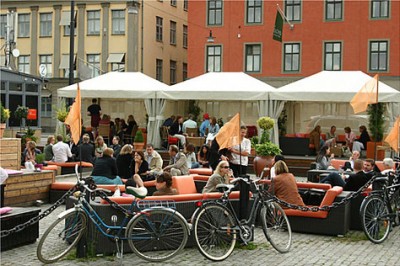Cool towns need a Linus Torvalds/Steve Jobs combo (2 of 2)

To recap the previous entry, Linus Torvalds galvanized an army of people to co-develop a superior ‘program’ called Linux, and Steve Jobs is able to interpret people’s values, principles and stories into stunningly designed products like the iMac and iPod.
Now, what if you combined the efforts and applied it to creative real estate development? You’d get a community of profoundly satisfied people committed to, entirely proud of, and inhabiting the phenomenally-designed place they help build. If you followed Torvald’s footsteps and crowdsourced a significant number of people to co-develop the ‘program’ of tenants and patrons for a business, building or block, then assimilated Steve Jobs’ skills and were able to interpret that collective program of tenants, patrons and their stories… you’d be able to transform that body of knowledge and emotion into extraordinarily designed ‘products’, namely as business and residential interiors, building exteriors, public spaces and the user experiences that go with them.
There are such development and business leaders undergoing that process right now – to create in the emotionally-driven manner and prolific effectiveness as Torvalds and Jobs – as profiled here and here. They are crowdsourcing the most progressive talent to define the very kind of place that inspires them, and will then work with the best design talent to execute that in the built form.
Coincidentally, the Linux mascot’s nickname is the same as mine. Hmmm.

I love this idea but i question the execution of it. I assume this would only work for a private development. From my experience when applied to a city run project, it would be near impossible to get a consensus for what everyone wants. for instance some people might want affordable or low income housing to be included. some might want art deco while others might want contemporary architecture.
so my question is, have you only seen this applied to private projects?
Gunther, I agree with you completely, the actual crowdsourced development process must be a private sector process to maintain quality control. However, it’s a tremendous help if the city was played a part in helping establish a city-wide group community of crowdsource candidates from which the private sector could pull from.
Thanks Neil. So you have seen something like this happen where the city helps out? I would think the city would have a hard time with even helping because you might use a selection process that they would be opposed to. For instance I would assume the selection process could be considered elitist.
i do love the idea for private development. are there stories of how this has come together? i know the site has pointed at some but maybe i haven’t read all the stories. i would love to try and benchmark some of these past successes with where i live.
The city can use whatever criteria they desire – it doesn’t have to match up precisely. It could be an arts-oriented group, or entrepreneur-oriented group. The point is, at least it’s a start. Some city-assisted efforts include 40 Below in Syracuse and Creative Tampa Bay. In the end, it’s just a more focused audience upon which to identify beta community members for a specific project.